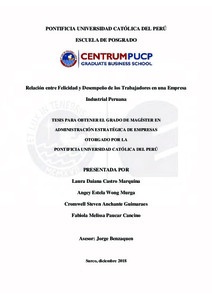| dc.contributor.advisor | Benzaquen de las Casas, Jorge Benny | |
| dc.contributor.author | Castro Marquina, Laura Daiana | |
| dc.contributor.author | Wong Murga, Angey Estela | |
| dc.contributor.author | Anchante Guimaraes, Cromwell Steven | |
| dc.contributor.author | Paucar Cancino, Fabiola Melissa | |
| dc.date.accessioned | 2019-01-11T16:40:45Z | |
| dc.date.available | 2019-01-11T16:40:45Z | |
| dc.date.created | 2018 | |
| dc.date.issued | 2019-01-11 | |
| dc.identifier.uri | http://hdl.handle.net/20.500.12404/13198 | |
| dc.description.abstract | La relación que existe entre la felicidad, en sus diferentes dimensiones o
componentes, con los diversos aspectos de la vida de las personas, ha despertado el interés de
muchos investigadores debido a su naturaleza subjetiva, otorgándole el término de bienestar
subjetivo a la felicidad en diferentes estudios realizados y considerándolo como indicador del
progreso y bienestar de las personas en las sociedades. Al respecto, el interés por conocer el
impacto del bienestar subjetivo sobre el desempeño de los trabajadores se ha incrementado en
las empresas debido a que la evidencia empírica demuestra que existe una mayor correlación
entre la satisfacción con la vida, componente del bienestar subjetivo, con el desempeño, que
la satisfacción laboral con este último, convirtiéndose este constructo, en una variable que
podría predecir mejor el desempeño. Utilizando los instrumentos Escala de Satisfacción con
la vida y el Índice Chamba 1.0 que evalúan la satisfacción con la vida y la satisfacción
laboral, el propósito de la presente investigación es determinar los factores de satisfacción
con la vida y satisfacción laboral más significativos y que se correlacionan con el desempeño
de los trabajadores, y que en su conjunto lo predicen mejor. Los resultados muestran que
existe una correlación significativa y baja entre el nivel de satisfacción con la vida (SWLS) y
el desempeño, y de igual manera, existe una correlación significativa y baja entre los factores
de la escala Chamba es chamba (mide satisfacción laboral) con el desempeño. Por otra parte,
se determinó que las variables que más impactan en el desempeño y que en conjunto
permitirán predecirlo mejor corresponden al nivel de la satisfacción con la vida (SWLS), las
expectativas del factor sentirse bien en el trabajo y la percepción de logro del factor sentirse
bien, lo que revela que sobre los ítems que constituyen estas áreas, es donde se debe diseñar
planes de acción que permitirán mejorar el desempeño de los trabajadores.
Palabras clave: felicidad, bienestar subjetivo, satisfacción con la vida, desempeño,
satisfacción laboral. | es_ES |
| dc.description.abstract | The relationship between happiness, in its different dimensions or components, and
the several aspects of people´s lives has increased the interest of many researchers about
subjective nature of happiness, referred as subjective well-being (SWB) in several performed
studies and considered nowadays as indicator of progress and well-being of societies. On this
regard, the interest of companies about impact of subjective well-being on the worker´s
performance has increased based on the empirical evidence that shows there is a greater
correlation between satisfaction with life, a component of SWB, and performance, than job
satisfaction with this last one, emerging this construct, as a better predictor of performance.
Using the instruments Life Satisfaction Scale and the Indice Chamba 1.0 which evaluate
satisfaction with life and job satisfaction, the purpose of this research is to determine the
factors of satisfaction with life and job satisfaction that are more significant and correlate
with performance of workers, and that as a whole, better predict their performance.
The results show that the correlation of satisfaction with life and performance is
significant and low, and it showed also the same results for the correlation of factors of
Chamba es chamba scale (measurement of job satisfaction) with performance. On the other
hand, it was determined that the variables which impact most the performance and could
predict it better as a whole belong to the level of the satisfaction with life (SWLS), the
expectations of the factor feeling good at work and the perception of achievement of the
feeling good factor, which reveals that any action plan to be designed to improve workers´
performance, should be based on the items that constitute these areas.
Keywords: happiness, subjective well-being, satisfaction with life, performance, job
satisfaction. | es_ES |
| dc.language.iso | spa | es_ES |
| dc.publisher | Pontificia Universidad Católica del Perú | es_ES |
| dc.rights | info:eu-repo/semantics/openAccess | es_ES |
| dc.rights.uri | http://creativecommons.org/licenses/by-nc-nd/2.5/pe/ | * |
| dc.subject | Felicidad y satisfacción laboral | es_ES |
| dc.subject | Felicidad y satisfacción profesional | es_ES |
| dc.subject | Investigación cuantitativa | es_ES |
| dc.title | Relación entre Felicidad y Desempeño de los Trabajadores en una Empresa Industrial Peruana | es_ES |
| dc.type | info:eu-repo/semantics/masterThesis | es_ES |
| thesis.degree.name | Maestro en Administración Estratégica de Empresas | es_ES |
| thesis.degree.level | Maestría | es_ES |
| thesis.degree.grantor | Pontificia Universidad Católica del Perú. CENTRUM | es_ES |
| thesis.degree.discipline | Administración Estratégica de Empresas | es_ES |
| renati.advisor.dni | 42800984 | |
| renati.advisor.orcid | https://orcid.org/0000-0001-8098-6401 | es_ES |
| renati.author.dni | 46576843 | |
| renati.author.dni | 41839224 | |
| renati.author.dni | 43819686 | |
| renati.author.dni | 41948931 | |
| renati.discipline | 413307 | es_ES |
| renati.level | https://purl.org/pe-repo/renati/level#maestro | es_ES |
| renati.type | https://purl.org/pe-repo/renati/type#tesis | es_ES |
| dc.publisher.country | PE | es_ES |
| dc.subject.ocde | https://purl.org/pe-repo/ocde/ford#5.02.04 | es_ES |






